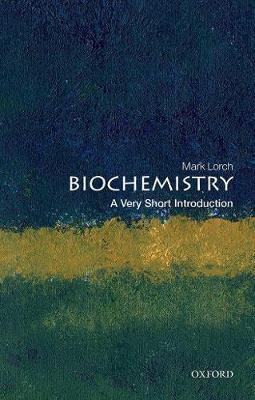Biochemistry: A Very Short Introduction

Biochemistry: A Very Short Introduction
Very Short Introductions: Brilliant, Sharp, Inspiring From the simplest bacteria to humans, all living things are composed of cells of one type or another, all of which have fundamentally the same chemistry. This chemistry must provide mechanisms that allow cells to interact with the external world, a means to power the cell, machinery to carry out varied processes within the cell, a structure within which everything runs, and also governance through a web of interlocking chemical reactions. Biochemistry is the study of those reactions, the molecules that are created, manipulated, and destroyed as a result of them, and the massive macromolecules (such as DNA, cytoskeletons, proteins and carbohydrates) that form the chemical machinery and structures on which these biochemical reactions take place. It didn't take long for an understanding of the chemistry of life to turn into a desire to manipulate it. Drugs and therapies all aim to modify biochemical processes for good or ill: Penicillin, derived from mould, stops bacteria making their cell walls. Aspirin, with its origins in willow bark, inhibits enzymes involved in inflammatory responses. A few nanograms of botulinum toxin (botox), can kill by preventing the release of neurotransmitters from the ends of nerves and so leads to paralysis and death, or give a wrinkle free forehead (if administered in very tiny quantities).This Very Short Introduction discusses the key concepts of biochemistry, as well as the historical figures in the field and the molecules they studied, before considering the current science and innovations in the field, and the interaction between biochemistry, biotechnology, and synthetic biology. ABOUT THE SERIES: The Very Short Introductions series from Oxford University Press contains hundreds of titles in almost every subject area. These pocket-sized books are the perfect way to get ahead in a new subject quickly. Our expert authors combine facts, analysis, perspective, new ideas, and enthusiasm to make interesting and challenging topics highly readable.
PRP: 80.54 Lei
Acesta este Prețul Recomandat de Producător. Prețul de vânzare al produsului este afișat mai jos.
72.49Lei
72.49Lei
80.54 LeiLivrare in 2-4 saptamani
Descrierea produsului
Very Short Introductions: Brilliant, Sharp, Inspiring From the simplest bacteria to humans, all living things are composed of cells of one type or another, all of which have fundamentally the same chemistry. This chemistry must provide mechanisms that allow cells to interact with the external world, a means to power the cell, machinery to carry out varied processes within the cell, a structure within which everything runs, and also governance through a web of interlocking chemical reactions. Biochemistry is the study of those reactions, the molecules that are created, manipulated, and destroyed as a result of them, and the massive macromolecules (such as DNA, cytoskeletons, proteins and carbohydrates) that form the chemical machinery and structures on which these biochemical reactions take place. It didn't take long for an understanding of the chemistry of life to turn into a desire to manipulate it. Drugs and therapies all aim to modify biochemical processes for good or ill: Penicillin, derived from mould, stops bacteria making their cell walls. Aspirin, with its origins in willow bark, inhibits enzymes involved in inflammatory responses. A few nanograms of botulinum toxin (botox), can kill by preventing the release of neurotransmitters from the ends of nerves and so leads to paralysis and death, or give a wrinkle free forehead (if administered in very tiny quantities).This Very Short Introduction discusses the key concepts of biochemistry, as well as the historical figures in the field and the molecules they studied, before considering the current science and innovations in the field, and the interaction between biochemistry, biotechnology, and synthetic biology. ABOUT THE SERIES: The Very Short Introductions series from Oxford University Press contains hundreds of titles in almost every subject area. These pocket-sized books are the perfect way to get ahead in a new subject quickly. Our expert authors combine facts, analysis, perspective, new ideas, and enthusiasm to make interesting and challenging topics highly readable.
Detaliile produsului










